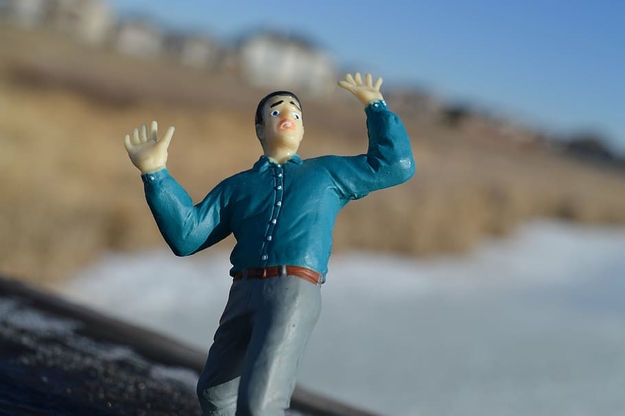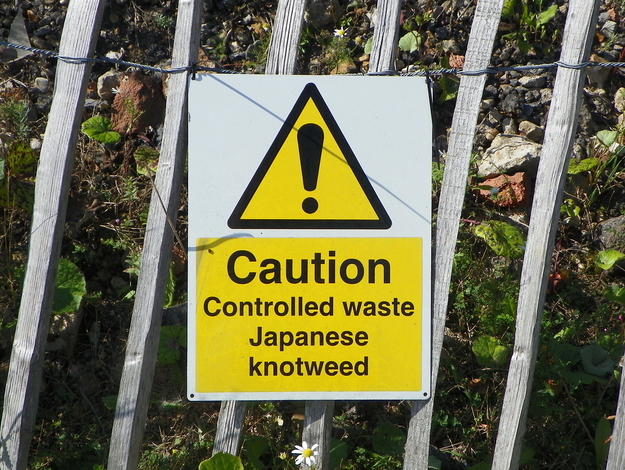Why are humans so afraid of Nature? Are we not part of it? Perhaps it is because, in some ways, it is still mysterious to us? Nature is multi-layered and complex system that we cannot completely control. Is this what scares us? Maybe it is the reason why we shield ourselves and try to find protection in our human made worlds. Or can this fear take more extreme forms, such as obsessions over a fear of animals or plants?
In October 2015, a UK newspaper published news of a husband who murdered his wife and then turned upon himself.
It was reported that the horrific incident happened because Mr McRae (the husband) was "driven mad" by Japanese Knotweed- an invasive species - taking over their home. His suicide note revealed that he has become obsessed by fears of not being able to sell his house, due to the invasion by the Japanese Knotweed.
Mr. McRae wrote:
"I believe I was not an evil man until the balance of my mind was disturbed by the fact that there is a patch of Japanese knotweed which has been growing over our boundary fence on the Rowley Regis Golf Course.
They were told about it by Sandwell Council two years ago, but did nothing about it.
So I started to cut it down regularly to control it, in a vain attempt to stop the blight on our property.
This was illegal, and it has proved impossible to stop, and made our unmortgaged property unsaleable.
The worry of it migrating onto our garden and subsequently undermining the structure over the next few years, with consequent legal battles, which we won't win, has led to my growing madness.
Jane and I were a very private couple, we chose to have no real friends, just enjoying each other.
But the despair has got so bad that I have killed her, as I did not want her to be alone without income when I killed myself.”
At a first glance this situation can seem like an over reaction or an act of a man who was mentally depressed already. This bizarre situation should make us question “how is this possible?”
However, it also shows that anxiety and frustration of the unknown can deeply affect your mental health. Any situation, as small or banal as it seems from the outside can spiral out of control and turn into a tragedy. But how?
A recent study from the University of Illinois at Chicago (UIC) shows that, “having an increased sensitivity to ambiguous, uncertain threats—or a hyper-vigilant fear of the unknown—is at the root of most fear-based psychopathologies.
According to an article in Psychology Today, the researchers in University of Illinois at Chicago (UIC) found that:
“A wide range of anxiety disorders—including panic disorder, social anxiety disorder, and specific phobias—all share a common response to generalised feelings of apprehension and heightened reactivity triggered by the unpredictability of ambiguous threats.”
This means that if someone is “hypersensitive” to uncertainty he or she can experience “state of free-floating anxiety” over future events for a day or more.
Due to the findings from the research new effective treatments that can identify the roots of fear-based psychopathology have been discovered.
Many humans live with different fears, many concerning their own future. In this case the Japanese Knotweed was the trigger for the situation, which did not only affect the McRaes in a tragic wa. The extreme hatred projected towards the species created the bigger problem, which affected the quality of the neighbourhood and the ability to sell the house, which was also economically damaging the people living there. The hatred towards the species pushed a person to his extremes because his property, and therefore also his future, were at stake.
Can there be different paths we can take to understand the unknown?
Besides the ability to experience fear, humans also have the ability to learn. The unknown does not necessarily need to frighten us or cause despair. While healthy fears are necessary for our survival, both as individuals or communities we also need to be open to new developments, new people, or the unknown in general.
However, if we only learn to suspect or hate, like in the case of the Japanese Knotweed, we continue to hate and vilify one another.
As we learn to respect the new, be it from nature or other human beings, we will be able to rethink our preconceived notions and find new ways to benefit from these new encounters, transforming anxious negative energies into positive ones.

